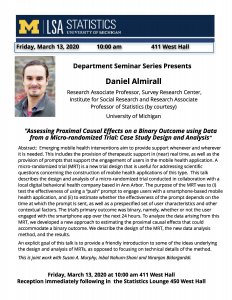Presented By: Department of Statistics
Canceled: Statistics Department Seminar Series: Daniel Almirall, Research Associate Professor, Survey Research Center, Institute for Social Research and Research Associate Professor of Statistics (by courtesy), University of Michigan
"Assessing Proximal Causal Effects on a Binary Outcome using Data from a Micro-randomized Trial: Case Study Design and Analysis"

"Assessing Proximal Causal Effects on a Binary Outcome using Data from a Micro-randomized Trial: Case Study Design and Analysis"
Abstract
Emerging mobile health interventions aim to provide support whenever and wherever it is needed. This includes the provision of therapeutic support in (near) real time, as well as the provision of prompts that support the engagement of users in the mobile health application. A micro-randomized trial (MRT) is a new trial design that is useful for addressing scientific questions concerning the construction of mobile health applications of this type. This talk describes the design and analysis of a micro-randomized trial conducted in collaboration with a local digital behavioral health company based in Ann Arbor. The purpose of the MRT was to (i) test the effectiveness of using a “push” prompt to engage users with a smartphone-based mobile health application, and (ii) to estimate whether the effectiveness of the prompt depends on the time at which the prompt is sent, as well as a prespecified set of user characteristics and other contextual factors. The trial’s primary outcome was binary, namely, whether or not the user engaged with the smartphone app over the next 24 hours. To analyze the data arising from this MRT, we developed a new approach to estimating the proximal causal effects that could accommodate a binary outcome. We describe the design of the MRT, the new data analysis method, and the results.
An explicit goal of this talk is to provide a friendly introduction to some of the ideas underlying the design and analysis of MRTs, as opposed to focusing on technical details of the method.
This is joint work with Susan A. Murphy, Inbal Nahum-Shani and Niranjan Bidargarddi.
Abstract
Emerging mobile health interventions aim to provide support whenever and wherever it is needed. This includes the provision of therapeutic support in (near) real time, as well as the provision of prompts that support the engagement of users in the mobile health application. A micro-randomized trial (MRT) is a new trial design that is useful for addressing scientific questions concerning the construction of mobile health applications of this type. This talk describes the design and analysis of a micro-randomized trial conducted in collaboration with a local digital behavioral health company based in Ann Arbor. The purpose of the MRT was to (i) test the effectiveness of using a “push” prompt to engage users with a smartphone-based mobile health application, and (ii) to estimate whether the effectiveness of the prompt depends on the time at which the prompt is sent, as well as a prespecified set of user characteristics and other contextual factors. The trial’s primary outcome was binary, namely, whether or not the user engaged with the smartphone app over the next 24 hours. To analyze the data arising from this MRT, we developed a new approach to estimating the proximal causal effects that could accommodate a binary outcome. We describe the design of the MRT, the new data analysis method, and the results.
An explicit goal of this talk is to provide a friendly introduction to some of the ideas underlying the design and analysis of MRTs, as opposed to focusing on technical details of the method.
This is joint work with Susan A. Murphy, Inbal Nahum-Shani and Niranjan Bidargarddi.